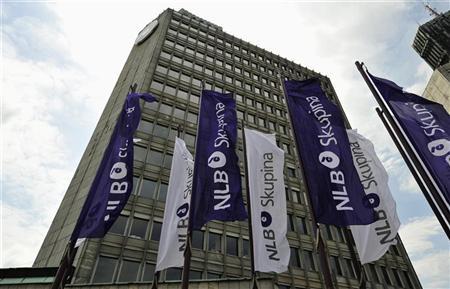(Reuters) – When he took control of his country’s biggest bank in 2009, Drasko Veselinovic expected a rough ride.

He knew Slovenia’s state-owned Nova Ljubljanska Banka (NLB) was facing difficulty as the country’s boom years began grinding to a halt.
But what he did not expect was the same politicians who berated him in public to be privately asking for secret favors.
Some “would strongly criticize me in the media”, he told Reuters, “and on the very same day they would press one of my colleagues on the management board for a loan for a certain company”.
In the years when Slovenia was booming, and the success of this tiny ex-Communist Alpine state was seen as little short of a miracle, NLB seemed to epitomize what had gone right.
Now, as Slovenia joins the list of euro zone countries facing a possible bailout, the bank’s tale seems to sum up not only what went wrong here, but the toxic mix of politics and finance that has bedevilled the banking system across Europe.
NLB denies giving loans based on political connections.
Green and mountainous in its 8,000 square miles between Italy and Austria, Slovenia had been a trailblazer for the rest of the former Yugoslavia and eastern Europe.
When the country of 2 million people joined Europe’s single currency in 2007, its economy was the union’s fastest growing, driven by exports of Renault cars, household appliances and pharmaceuticals.
It even ran a balanced budget and was the envy of its fellow former Yugoslav republics, countries that, unlike Slovenia, had been stunted and scarred by ethnic conflict.
Tall and distinguished in wire-rimmed glasses, Veselinovic, 53, had run the Slovenian bourse until 2004, and rose to become Chief Executive Officer of NLB in early 2009, signing up to a five-year term.
But he resigned within three months, citing political interference. The state now owns 64 percent of NLB, up from 59 percent after a capital hike this month.
“The political pressure took various forms, but was always present,” said Veselinovic.
“I had to leave because I didn’t agree with some of the crazy ideas of politicians, which would have meant big problems for the bank even sooner than they actually came about.”
Since his departure it has emerged that Slovenia’s state-owned banks, NLB chief among them, are shackled with huge portfolios of bad loans that Slovenia’s now-shrinking economy can ill afford to cover. These include 1.5 billion euros of loans at NLB that the country’s finance minister said in July would probably not be repaid.
NLB told Reuters it had about 3 billion euros of poorly performing loans, but could not say how much would be repaid. Its plight has triggered speculation that Slovenia may become the sixth member of the 17-nation currency union to seek a bailout from its partners.
DENIAL
Accused of handing big loans to the politically connected with insufficient regard for risk, NLB has swallowed four capital injections totaling more than 1 billion euros since Slovenia joined the euro, the latest funded solely by the state when it provided 381 million euros in fresh capital this month.
Both the current government and opposition are trading blame for the crisis, accusing the other of political interference; most analysts say the blame should be shared.
“I never called any banker and told him to give someone a loan of 1 million or 10 million euros … But there are people who have such power,” Prime Minister Janez Jansa, of the ruling Slovenian Democratic Party, told television channel Kanal A last week, referring to a NLB loan for a project of an opposition-controlled city council.
Spokesmen for the two main opposition parties, Positive Slovenia and the Social Democrats, gave no immediate comment.
In a statement to Reuters, NLB rejected the accusation of favoritism.
“Political connection cannot be the basis for a loan. Loans are given based on checking the credit rating of the creditor, judging the project that is being financed and estimating the money flow that would ensure that the loan will be repaid,” the company said.
Finance Minister Janez Sustersic says NLB may need another injection of up to 500 million euros ($613 billion) by the end of next year.
Local media reports say Slovenia’s second and third-largest banks – state-owned Nova KBM and partially state-owned Abanka Vipa – might together need 150 million euros this year to cover bad loans.
Not a problem while the good times rolled, but Slovenia’s 36 billion euro economy is now facing a renewed contraction of at least 0.9 percent this year, according to a government forecast, as demand for its exports in crisis-hit Europe wanes.
The budget gap reached 6.4 percent of economic output in 2011, more than double the EU’s target ceiling.
The government strenuously denies needing a bailout for its ailing banks, for now. The markets are not so sure.
Slovenian five-year credit default swaps are up more than 200 percent on a year ago at 440 basis points, and the government was forced in April to shelve plans to issue a 1.5 billion euro sovereign bond because the yield demanded exceeded 5 percent.
The reluctance of successive Slovenian governments to sell the country’s major assets, including its banks, is now coming back to haunt them.
The plight of NLB, Nova KBM and Abanka Vipa “provides the greatest proof of the damage done by state ownership and the links between the economy and politics”, said economist Igor Masten.
Masten served for three years on the NLB’s supervisory board, which is mostly state-appointed, but was dismissed in June as part of a changing of the guard when a new centre-right coalition came to power with its own ideas on how the bank should be run.
The three banks, which control more than 50 percent of the Slovenian banking market, now account for the lion’s share of about 6 billion euros in bad loans, or 11.8 percent of all loans at the end of March. Most date back to the boom years of 2006-2008.
Both Masten and Veselinovic declined to name names or elaborate on the most egregious political meddling.
One case that has surfaced is that of Simona Dimic, who as an aide to then Prime Minister Borut Pahor in 2009 received a loan of 350,000 euros from NLB at a relatively low interest rate.
Slovenian media jumped on the sum and the favorable terms as evidence of favoritism, and Dimic later resigned citing media pressure, though she denied getting special treatment or other wrongdoing.
Citing national interest, Slovenia for years shunned suitors for its stakes in key enterprises but is now scrambling to sell off the banks.
RUSH TO PRIVATISE
The country’s last big bank sales were back in 2001, when SKB was sold to France’s Societe Generale, and in 2002 when Banka Koper was sold to Italy’s Sanpaolo IMI. Both banks now operate profitably.
In 2002, Slovenia sold 34 percent of NLB to Belgian banking and insurance group KBC but later rebuffed KBC’s efforts to take a majority stake.
KBC did not take part in NLB’s capital hike this month, and its share in the bank is now 22 percent.
The government hopes that by reducing its majority stake in the two largest banks, NLB and Nova KBM, to 25 percent, it could drive down the interest it has to pay on its bonds. It also wants to create a state holding firm to take over bad loans in the state banking sector.
Analysts say it must also free up the labor market, raise the retirement age and improve the efficiency of the public health system if the economy is to really turn the corner.
“The situation in private banks is much better than in the banks owned by the state,” Prime Minister Jansa told reporters this month.
“Keeping the banks in state hands would only lead to the constant need for capital hikes.”
But buyers are hard to come by, particularly after successive governments blocked a number of major privatization deals.
Last year, the previous centre-left government blocked the sale of Slovenia’s largest food retailer Mercator to its Croatian rival Agrokor, saying the deal would hurt the Slovenian food industry and the economy as a whole.
And in 2008, Jansa’s then centre-right government rejected all bids for the national telecoms operator Telekom, saying they were too low.
“Slovenia rejected serious bidders several times, as in the cases of NLB, Mercator and Telekom, so it’s no longer credible as a serious seller, and that’s why it’s even more difficult to find a buyer for NLB now,” said Veselinovic.
NLB was one of 12 local lenders and firms that planned to sell their joint stake in Mercator when the government stopped the deal last year.
Having banked on about 100 million euros for NLB from the sale, CEO Bozo Jasovic quit. He remains in charge as the government seeks a successor.
“The political pressure around the sale of Mercator was quite open,” said former NLB supervisory board member Masten.
“Ministers were writing to the (NLB) management demanding that they take into account the consequences for the Slovenian food industry and the economy.”
Veselinovic, who now teaches at Ljubljana’s Faculty of Economics, said Slovenia could still avoid a bailout, “but the price will again by paid by the taxpayers”.
“Given that the price that could be reached for NLB is low, Slovenia will probably end up keeping the bank while all the bad loans of the past will be covered by the budget, which means by the taxpayers.”
($1 = 0.8154 euros)
(Editing by Matt Robinson and Will Waterman)





